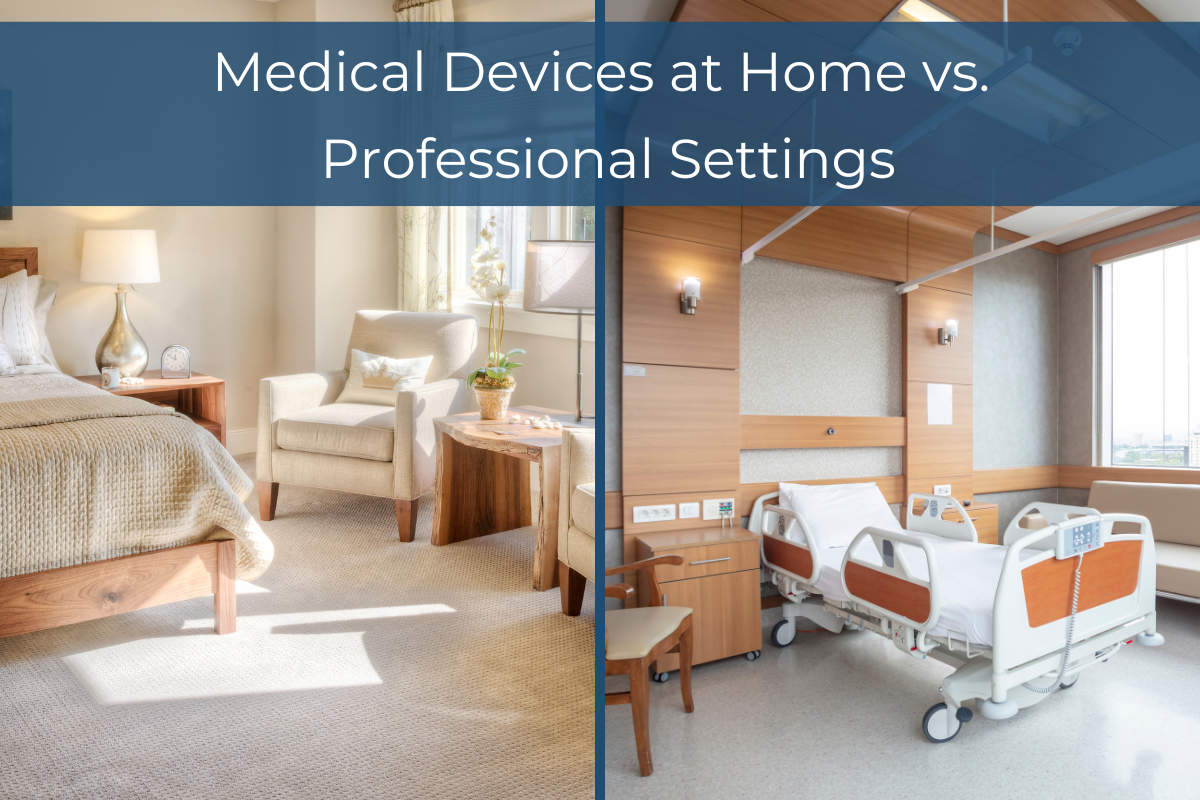The environment in which a medical device will be used significantly impacts its design, performance, and regulatory requirements. Devices used in professional settings, such as hospitals and clinics, are typically handled by trained personnel. However, those designed for home care need to cater to a broader range of users, some of whom are coming to the medical devices with no technical expertise. A medical device’s intended environment dictates everything from the regulations that apply to the power supply units (PSUs) that will be used to ensure device safety and reliability in that setting.
What do medical device manufacturers need to know about the differences in design and PSU choice based on home versus professional environments? We’ll cover the basics in this article.
Home Medical Devices
Manufacturers that produce home medical devices are generally building units that are meant for millions of people, so the total costs are higher. However, the devices themselves are smaller and the price per unit is lower, making them more cost-effective overall.
While all electrical medical devices need to abide by IEC 60601-1, devices with home care applications also have their own standard they need to abide by: IEC 60601-1-11, or “Requirements of Medical Electrical Equipment and Medical Electrical Systems Used in Home Care Applications.”
Manufacturers of home healthcare devices may save at scale. However, they also have special regulatory challenges. Their products are often operated by untrained users. Home environments have less control and predictability compared to healthcare facilities. Design, instructions, training, and maintenance measures must be applied to cater to these operators. Home healthcare devices may also need to comply with other standards, depending on the device’s applications.
What’s Included in a Home Healthcare Environment?
A home healthcare environment includes the patient dwelling and other indoor/outdoor spaces where patients are present. What this doesn’t apply to is healthcare environments that include continually available operators who have medical training.
Medical devices that operate in home healthcare settings should abide by certain testing requirements, include specified markings, provide safeguards against asphyxiation and strangulation, have proper documentation, and be compliant with electronic emissions standards.
Outside of equipment that is permanently installed, home healthcare medical devices should be Class II or internally powered. Class II devices should have 2-wire AC input with no ground connection. Applied parts in home healthcare devices should either be Type BF or Type CF. Type BF parts are body-floating applied parts that make direct electrical contact with the patient, but not directly to the heart. Type CF parts make contact with the heart in a direct conductive way.
While this may seem counterintuitive, this requirement is due to the level of protection these applied parts offer against leakage current and electrical shock. Type B applied parts work best in environments with reliable electrical grounding and professional-grade safety measures. Because Type BF and Type CF applied parts require higher levels of isolation and protection against leakage current, they’re safer to use in home settings.
Professional Medical Environments
Compared to medical devices made for home environments, hospital equipment generally comes with more features and precision components. There is less of a concern about user-friendliness and affordability. This is often traded in favor of more complex designs and use cases.
Of course, cutting-edge technology also tends to come at higher price points, which works well for hospitals that have larger budgets and can afford to purchase more advanced equipment at lower quantities. Medical device manufacturers will produce in the thousands for hospitals compared to in the millions for home healthcare settings.
While design complexity, cost sensitivity, and production scale all set professional medical devices apart from those used in the home, standards also differ. Hospital equipment tends to operate in more controlled environments that have more consistent power quality. However, devices used in these settings also tend to be more life-sustaining, so they require more redundancies and fail-safe mechanisms.
Power Supplies in Medical Devices at Home or Professional Settings
The power supply sits at the center of medical devices in both home and professional settings. Reliability is important in each environment. Still, specific demands on PSUs will differ.
In professional environments, hospital equipment requires extremely high availability from PSUs. However, it’s generally assumed that a trained professional will be operating the equipment. Home devices also need to be reliable. Compared to devices used in professional environments, they are generally not as critical or life-sustaining in nature. Home devices are also subject to greater variability in terms of power. Homes have less predictable electromagnetic interference and voltage fluctuations. Being operated by untrained professionals also increases the likelihood of potential misuse. Power supplies used in home medical devices must be compact, robust, and efficient to meet customer expectations while remaining safe.
Custom Power Supplies for Professional Environments
For medical device manufacturers looking for reliable, customizable solutions solutions in professional environments, RAM Technologies can help. Our medical-grade, PC-based power supplies are tailor-made for professional environments and can offer the reliability and safety needed for hospital settings. We also have customizations available for outputs and cords. Manufacturers who require additional customizations should contact us to find out more about what we can do for you.
RAM Technologies’ power supplies are 60601-1 3.2 certified. When you’re designing your medical device and need help with a PSU, contact us for details.
More Resources:
What the FDA Moving to IEC 60601-1 3.2 Means for Manufacturers
What Are Applied Parts?
EMC Compliance and EN 55011
